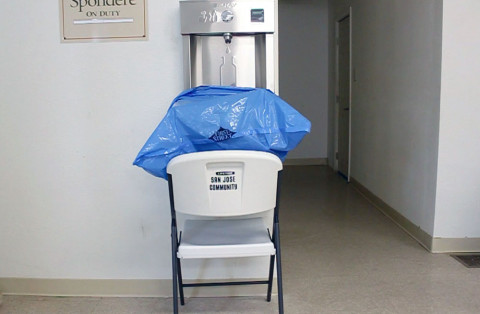
- This additional water bottle refilling station has been installed in the learning center at the San Jose Community Center in Thermal, Calif. This water station and the water station in the community center are not fully operational yet; Pueblo Unido CDC hopes to connect the water stations early next year. Photo: Courtesy of Pueblo Unido CDC
IVAN VALENZUELA/ Coachella Uninc.
THERMAL, Calif. — For farmworker families living in the rural eastern Coachella Valley, it’s a well known fact: you can’t trust the water coming out of your faucet. Due to high levels of arsenic found in the groundwater here, residents have grown accustomed to buying cases of bottled water, for drinking and cooking, from the nearest grocery or convenience store, sometimes traveling miles to do so.
Now, those routines are becoming increasingly unnecessary thanks to efforts to install clean water dispensing stations at strategic locations throughout the eastern Coachella Valley. Most recently, a water bottle refilling station was installed near the San Jose Community Center in Thermal.
Rodolfo Pinon of Pueblo Unido CDC, a community organizing group, said families from the community can, for the first time, fill up bottles and containers with water that they know is safe to drink, without traveling outside of their immediate area. And students from Thermal, who catch their school bus right outside the community center, can fill up their water bottles before going to school.
“They don’t have to purchase bottled water, [so] it saves them money,” Pinon said. “And this is clean water. We put in a new system called a Filtronics system.”
Pinon said the Filtronics treatment system cost $80,000 to install, and will provide clean water to the new refilling station as well as additional stations that will be installed in the future.
The water station at the San Jose Community Center was installed with support from the Regional Access Project Foundation, whose “Rethink Your Drink” campaign aims to increase access to clean drinking water. It is the first station to be installed near one of the many mobile home communities in the east valley, projected to serve more than 90 people at Vargas Mobile Home Park.
In the nearby City of Mecca, where residents are overwhelmingly farmworkers, two water bottle refilling stations were installed this past summer, one at the local Boys and Girls Club and the other at the Mecca Community Center. Like in Thermal, the stations provide a crucial service for residents, according to Sergio Carranza, Executive Director of Pueblo Unido CDC.
“The good news is that in Mecca, at least in the downtown area, the water stations are connected to the Coachella Valley Water District, so everyone is safe drinking that water,” Carranza said. “Having these dispensers will give [residents] the opportunity to drink more water.”
Over the past six months, a total of ten clean water stations have been installed in the eastern Coachella Valley by the RAP Foundation, in partnership with Riverside County Department of Public Health, Building Healthy Communities Eastern Coachella Valley, the Coachella Valley Housing Coalition, Pueblo Unido CDC and The California Endowment.
In addition to alleviating a widespread need for clean water in residential areas, the campaign is also targeting public spaces where youth congregate, such as Boys and Girls Clubs and schools.
Sydney Weyl, a senior at Coachella Valley High School, comes to the Boys and Girls Club every day. Weyl, who used to weigh 300 pounds, said that replacing the soda machine with a clean water station a year ago helped tremendously in his effort to lose weight. A year later and 70 pounds lighter, Weyl said he stops by the Club every day to fill up his water bottle.
“We get water from all the things we eat throughout the day, but when you get it directly from a water fountain, it’s extremely helpful, and it’s really good for you,” said Weyl.
Water stations have also been installed in city parks and apartment complexes, making clean water available to more community members.
The Las Casas Apartment complex in Coachella, which provides housing to low-income families and farmworkers, received a water station in November — it provides clean water for close to 600 residents.
Trinidad Arredondo, a program officer with the RAP Foundation, said he hopes the water stations will help all residents, young and old, develop healthier drinking habits. He said the RAP Foundation plans to keep installing more water stations in the east valley, with help from their community partners. Each water station costs approximately $1,450 to install.
Weyl said he has seen first hand how the water stations are making it easier for the younger kids at the Coachella Boys and Girls Club to make healthy decisions, something he wishes he had done earlier in his childhood.
“I used to be very overweight, and I wouldn’t get enough water,” Weyl said. “It’s great [to be] exposed to a new water station like this, especially when you’re just growing up.”

The water bottle refilling station at the San Jose Community Center in Thermal, Calif. is the first of its kind to be installed near one of the mobile home communities. This station will provide access to clean water for families in rural areas of the eastern Coachella Valley. Photo: Amber Amaya/ Coachella Uninc.
Editor’s Note: This article is part of a series on the Rethink Your Drink initiative supported by the Regional Access Project Foundation.